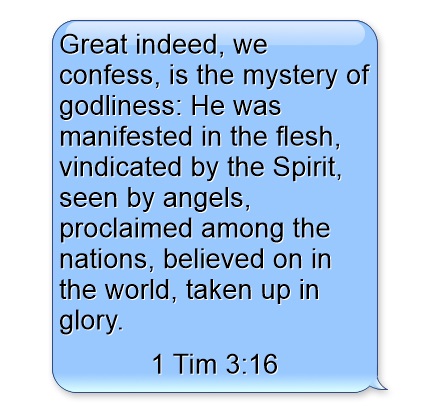Definition of Manifested in the Bible
Manifested in the Bible refers to something that is revealed or made known openly. It signifies the visible expression of divine power or presence.
In the Bible, manifestations are often associated with miracles, signs, and wonders performed by God to demonstrate His authority and glory. The concept of manifested in the Bible can also refer to the physical appearance of God or His messengers to individuals.
This term is significant in understanding the supernatural occurrences and divine interventions documented in the Scriptures. By studying how God has manifested Himself in the Bible, believers gain insight into His character, promises, and purposes for humanity.
Exploring The Concept Of Manifestation
Manifestation In Biblical Context
Manifestation in the Bible refers to the act of something becoming visible or evident.
Examples Of Manifestation In The Bible
1. Burning Bush: God manifested to Moses through a burning bush.
2. Parting of the Red Sea: God manifested His power by parting the Red Sea for the Israelites.
3. Jesus’ Miracles: Jesus manifested divine power through miracles like healing the sick.
Credit: www.quora.com
Interpretations Of Manifestation
Manifestation in the Bible is a concept with multifaceted interpretations that hold significant spiritual and practical implications. Understanding these interpretations sheds light on how divine revelation and physical evidence are perceived within the biblical context.
Manifestation As Divine Revelation
Divine revelation, as a manifestation, is the belief that God reveals Himself to humanity through various means. This can be through visions, dreams, or direct communication, offering insight and guidance to individuals or communities. The concept of manifestation as divine revelation underscores the idea that God’s presence and wisdom are made known to those who seek it.
Manifestation As Physical Evidence
Manifestation as physical evidence refers to tangible demonstrations of God’s power and presence in the physical world. This can include miracles, healings, and supernatural occurrences that serve as visible manifestations of God’s intervention and involvement in the lives of believers. Such manifestations provide reassurance and strengthen faith in the divine.
Significance Of Manifestation In The Bible
Manifestation in the Bible refers to the clear display of divine power or presence. It signifies the visible or tangible evidence of God’s work among His people. When something is manifested in the Bible, it is made known and revealed in a profound and impactful way.
Manifestation is a term that refers to the act of revealing or making something visible. In the Bible, manifestation is a powerful concept that is used to describe God’s presence and activity in the world. The Bible teaches that God has manifested himself in various ways throughout history, from the creation of the world to the birth of Jesus Christ.Manifestation As A Tool For Communication
One of the primary ways in which God uses manifestation in the Bible is as a tool for communication. Through various forms of manifestation, God communicates his will and purpose to his people. For example, in the Old Testament, God manifested himself to Moses in the burning bush to reveal his plan for the Israelites’ deliverance from Egypt. Similarly, God manifested himself to prophets like Isaiah and Jeremiah to communicate his message of judgment and redemption to the people of Israel.Manifestation As A Source Of Faith Strengthening
In addition to being a tool for communication, manifestation is also a source of faith strengthening in the Bible. When God manifests himself to his people, it reinforces their faith and trust in him. For example, when Jesus performed miracles like healing the sick and feeding the multitudes, it was a manifestation of God’s power and love that strengthened the faith of his followers. Similarly, when the Holy Spirit manifested himself to the apostles at Pentecost, it empowered them to preach the gospel with boldness and conviction. In conclusion, manifestation is a significant concept in the Bible that serves as a tool for communication and a source of faith strengthening. Through various manifestations, God reveals himself to his people and reinforces their faith in him. As believers, we should seek to understand and appreciate the significance of manifestation in the Bible and how it applies to our lives today.
Credit: purelypresbyterian.com
Different Forms Of Manifestation
The concept of manifestation in the Bible encompasses various forms, each carrying unique significance and purpose. Understanding the different forms of manifestation can deepen our comprehension of biblical teachings and principles. Let’s explore the various forms of manifestation, including miraculous manifestations and symbolic manifestations.
Miraculous Manifestations
Miraculous manifestations in the Bible refer to instances where divine intervention is visibly and unmistakably displayed. These manifestations often involve supernatural occurrences that defy natural laws, such as healing the sick, raising the dead, or parting the seas. They serve as powerful demonstrations of God’s omnipotence and compassion, inspiring faith and awe among believers.
Symbolic Manifestations
Symbolic manifestations in the Bible involve the use of tangible elements or events to convey deeper spiritual truths or principles. For example, the use of symbols such as the burning bush, the rainbow, or the Passover lamb carries rich symbolism and represents profound spiritual realities. These manifestations provide layers of meaning and convey important messages that resonate with the readers on a symbolic and spiritual level.
Manifestation And Human Response
Impact Of Manifestation On Believers
When believers witness the manifestation of God’s power, it ignites a deep sense of awe and reverence in their hearts. The tangible display of divine presence reaffirms their faith and strengthens their spiritual resolve.
Challenges In Recognizing Manifestations
Recognizing manifestations can be challenging, as they often occur in unexpected ways and may not conform to our preconceived notions. It requires a discerning spirit and a willingness to look beyond the ordinary to perceive the extraordinary work of God.
Controversies Surrounding Manifestation
The controversies surrounding the definition of manifestation in the Bible have sparked debates among scholars and theologians. Different interpretations and perspectives on how manifestations are portrayed in the scriptures have led to diverse opinions and discussions within religious communities. The multifaceted nature of this topic continues to generate interest and inquiry among those seeking a deeper understanding of biblical teachings.
Manifestation is a term that has been used in the Bible to refer to the act of making something visible or apparent. In recent times, the concept of manifestation has become popular in the self-help industry, with many people promoting the idea that you can manifest your desires into reality. However, the use of this term has been a subject of controversy, with some people questioning its validity. In this post, we will explore some of the controversies surrounding manifestation, including skepticism and debates, misinterpretations and misconceptions.Skepticism And Debates
There are those who believe that manifestation is a pseudoscientific concept with no real basis in reality. Skeptics argue that the law of attraction, which is often linked to manifestation, is just a fanciful idea with no scientific evidence to support it. They believe that the idea of manifesting your desires is nothing more than wishful thinking and that it is not possible to change your reality just by thinking positively. Debates around manifestation have been ongoing, with some people claiming that they have manifested their desires and others arguing that it is just a coincidence. Some proponents of manifestation believe that it is a spiritual concept that requires faith and belief, while others see it as a practical tool for achieving success in life.Misinterpretations And Misconceptions
Another controversy surrounding manifestation is the misinterpretation and misconceptions that are often associated with it. Some people believe that manifestation is a magical process that requires no effort on their part. They think that all they have to do is think positively, and their desires will automatically manifest. However, this is not the case. Manifestation requires action and effort on your part. It is not enough to just think positively; you have to take practical steps towards achieving your goals. Additionally, manifestation is not a one-time event; it is an ongoing process that requires consistency and perseverance. In conclusion, the controversies surrounding manifestation are not likely to end anytime soon. Skeptics will continue to question its validity, while proponents will continue to promote it as a tool for achieving success in life. However, regardless of where you stand on the issue, it is important to remember that manifestation requires action and effort on your part. By taking practical steps towards your goals and maintaining a positive mindset, you can increase your chances of manifesting your desires into reality.Comparative Analysis With Other Religious Texts
When exploring the concept of manifestation in the Bible, it is essential to undertake a comparative analysis with other religious texts. This approach allows for a broader understanding of how the notion of manifestation is perceived and articulated across different faith traditions. In this context, we will delve into the manifestation in the Quran and the manifestation in Hindu scriptures to draw insightful comparisons.
Manifestation In The Quran
The Quran, the central religious text of Islam, also addresses the concept of manifestation. It emphasizes the divine revelation and the embodiment of God’s attributes in the physical realm. The Quranic verses elucidate the manifestation of divine will and purpose in the world, offering a unique perspective on this profound concept.
Manifestation In Hindu Scriptures
Hindu scriptures, such as the Vedas, Upanishads, and Bhagavad Gita, expound upon the concept of manifestation in the form of avatars, divine incarnations, and cosmic manifestations. These texts depict the manifestation of deities and their interactions with the mortal world, portraying a rich tapestry of divine presence and intervention.

Credit: www.linkedin.com
Modern-day Relevance Of Manifestation
The concept of manifestation as depicted in the Bible holds profound significance in today’s world. Its essence transcends time, offering wisdom and guidance to navigate through life’s challenges with clarity and purpose.
Manifestation In Contemporary Religious Practices
In contemporary religious practices, the idea of manifestation is upheld through prayer, meditation, and visualization. Believers harness the power of faith to bring their desires into reality, aligning their actions with divine will.
Scientific Perspectives On Manifestation
From a scientific standpoint, the concept of manifestation aligns with the principles of positive psychology and the law of attraction. The power of thoughts and intentions to shape one’s reality is increasingly recognized and studied.
Conclusion
The concept of manifested in the Bible is a powerful and transformative one. It illustrates the divine presence and the tangible expression of God’s will in the lives of believers. Understanding this concept can deepen our faith and inspire us to live in alignment with God’s purpose.
As we continue to explore the manifestations in the Bible, may we be encouraged to seek and embrace the presence of God in our lives.






